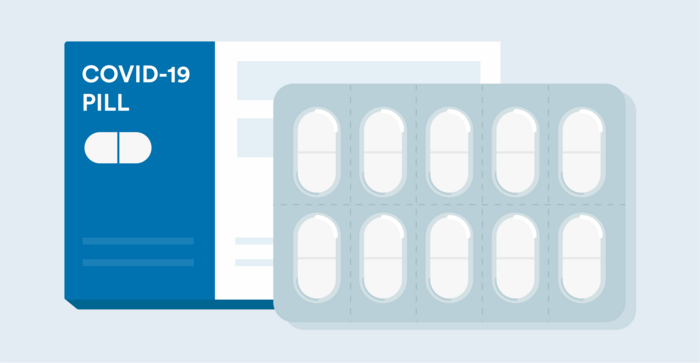Key points
- The FDA has approved two COVID-19 pills, Pfizer’s Paxlovid and Merck’s Molnupiravir, for emergency use.
- These pills are not a cure, but can help in treating COVID-19 infections, especially in high-risk patients.
- Urgent care centers are likely to play a key role in distributing these pills.
- The pills are designed to prevent the virus from replicating, potentially reducing hospitalizations and deaths.
- The COVID-19 pills will likely soon be available in hospitals and urgent care centers across the United States. They are designed to help high-risk COVID-19 patients avoid hospitalizations and deaths from severe illness.

As COVID-19 cases surge to record numbers, there may be hope on the horizon. In December 2021, the FDA issued an emergency use authorization (EUA) for two new COVID-19 pills to help combat the virus and its variants. Both therapies, Pfizer’s Paxlovid and Merck’s Molnupiravir, are designed to be taken in the safety of our homes, according to the FDA. The new oral antiviral therapies are not a cure but may help millions get timely treatment for COVID-19 infections.
According to the Urgent Care Association (UCA), urgent care locations are highly likely to be instrumental in getting these pills to patients. This is because they can be distributed at the point of care as z-packs.
As the new medication becomes available across the country, you may have several questions. These may include: How do the COVID-19 pills work? Do they work against the Omicron variant, the dominant strain in the United States? Are they safe? Are they approved for children? How and where can you get the pills? When should you take them?
The bottom line: The COVID-19 pills will likely soon be available in hospitals and urgent care centers all across the United States. According to the FDA, they are designed to help high-risk COVID-19 patients avoid hospitalizations and deaths from severe illness. To find out if you are eligible, you may use Solv to contact a healthcare professional or urgent care center near you.
Learning more can help you make the right choice for you or a loved one infected with the COVID-19 virus.
Who is eligible to take the COVID-19 pills?
The COVID-19 oral therapies, Paxlovid and Molnupiravir, are available by prescription only. They are authorized through an FDA emergency use authorization to treat mild-to-moderate COVID-19 in patients who:
· Test positive for COVID-19,
· Are at high risk of developing severe illness from a COVID-19 infection,
· Have at least one risk factor for severe illness, hospitalization, and death. These include obesity, diabetes, heart disease, or being over 60 years of age.
Are the COVID pills approved for children?
· Pfizer’s Paxlovid is authorized by the FDA for both adults and children over 12 years of age.
· Merck’s Molnupiravir is authorized by the FDA for adults only because it may affect bone and cartilage growth.
Why do you need a prescription?
Both Paxlovid and Molnupiravir are available by prescription only because they are designed to treat patients with the highest risk of developing severe illness, according to the FDA. More research and testing will be needed before they can be made available to all. According to the FDA, there is also very limited supply right now so distribution to patients will likely be tightly controlled.
Additionally, the FDA states that Paxlovid may interact with other medications you may be taking. A physician will evaluate your individual health risk and advise you accordingly.
Can pregnant people take the oral COVID pills?
Merck’s Molnupiravir is not recommended by the FDA for pregnant people because of the FDA’s concerns that the drug may induce mutations in an unborn fetus’s DNA.
According to the FDA, Paxlovid may be prescribed to a pregnant person based on the level of risk from COVID-19. If you tested positive for COVID-19 and are pregnant, or suspect you may be pregnant, discuss your options with a healthcare provider.
How do the COVID-19 pills work?
About Pfizer’s Paxlovid
In a clinical trial, Paxlovid proved near 90% effective at preventing hospitalizations and deaths in high-risk patients.
According to the FDA, Paxlovid is actually a combination of two treatments:
· Nirmatrelvir: The newly developed therapy that stops the COVID-19 virus from replicating by blocking a protein that the virus needs, and
· Ritonavir: An existing antiviral drug which slows the breakdown of Nirmatrelvir in our bodies to allow it to work for a longer time.
The treatment consists of three pills taken together - two tablets of Nirmatrelvir and one tablet of Ritonavir - two times a day for five days. The drugs are only effective within five days of symptoms appearing, states the FDA.
About Merck’s Molnupiravir
Merck’s Molnupiravir did not fare as well as Pfizer’s in early clinical trials, as reported by the FDA. Initially, it was 50% efficient in reducing the risk of severe illness, hospitalization, and death. , Shortly after, the efficacy reduced to 30%.
According to the FDA, Molnupiravir works by interfering with the COVID virus’s genetic code to prevent it from replicating. There have been some concerns that because it induces mutations in the SARS-CoV-2 virus, it may help develop new variants.
The Molnupiravir treatment course consists of four capsules taken orally every 12 hours for five days. It cannot be used for longer than five consecutive days, in accordance with FDA recommendations.
Do the COVID-19 Pills work against the Omicron variant?
According to early clinical studies by Pfizer, it appears that its COVID pill is maintaining its effectiveness against the Omicron variant but it is still too early to say for certain. All prior treatment options against COVID-19 involved a category of drugs called monoclonal antibodies, according to the FDA. These depended on our immunity to lead the battle against infection. However, Omicron’s mutations evade our natural immune systems and render these therapies less effective, reports the FDA.
According to the FDA, there have been more breakthrough infections (infections in fully-vaccinated individuals) with Omicron than with previous variants, though most symptoms have been mild. A recent Danish study of over 12,000 households found that the Omicron variant can evade vaccinated people’s immunity better than the Delta.
Paxlovid and Molnupiravir, on the other hand, work directly on the virus itself to prevent it from replicating. This type of therapy may prove more effective to prevent hospitalizations and deaths in high-risk patients, reports the FDA.
As Omicron spreads fast and wide, the two oral drug therapies can help keep patients at home and avoid overwhelming our healthcare system, reports the FDA. All other therapies are typically administered in a clinical setting.
Why are vaccines needed if we have at-home COVID pills?
The FDA notes that the COVID-19 pills, Paxlovid and Molnupiravir are not preventive. They are designed to be taken only after you test positive for COVID-19 and are at a high risk of disease progression.
According to the FDA, COVID-19 vaccines and a booster are the best frontline defense against COVID-19, and you can book yours through the Solv Health site, quickly and easily. However, the pills may help lower the risk of hospitalizations and deaths from COVID-19 in unvaccinated people.
The pills are new and it takes time to manufacture and distribute them. Fortunately, according to the FDA, both Pfizer and Merck have ramped up production and the U.S. Federal Government plans to buy and distribute millions of treatment courses over the rest of the year to all the states.
Where can I get the COVID-19 pills?
The COVID-19 pills are available by prescription only and are authorized for use within five days from when symptoms arise, according to the FDA.
An early diagnosis is critical to you or a loved one getting timely medical help.
If you are having symptoms or had an exposure, book a COVID test with a healthcare professional near you on Solv or get a convenient telemedicine appointment with local providers on Solv. Solv offers telemed services in over 40 states across the U.S.
FAQs
What are the new COVID-19 pills?
The new COVID-19 pills are Pfizer’s Paxlovid and Merck’s Molnupiravir. They are oral antiviral therapies designed to help treat COVID-19 infections.
How do these COVID-19 pills work?
Both Paxlovid and Molnupiravir work by preventing the COVID-19 virus from replicating, which can help reduce the severity of the infection.
Who can take these COVID-19 pills?
The pills are available by prescription only for patients who test positive for COVID-19 and are at high risk of developing severe illness. This includes patients with risk factors such as obesity, diabetes, heart disease, or being over 60 years of age.
Are these pills safe for children and pregnant people?
Pfizer’s Paxlovid is authorized for adults and children over 12 years of age. Merck’s Molnupiravir is not recommended for pregnant people or children due to potential risks.
Where can I get these COVID-19 pills?
The pills will likely be available in hospitals and urgent care centers across the United States. They are available by prescription only and should be taken within five days of symptoms appearing.
Do these COVID-19 pills work against the Omicron variant?
Early clinical studies by Pfizer suggest that its COVID pill might maintain its effectiveness against the Omicron variant, but it is still too early to say for certain.
Why are vaccines still needed if we have these at-home COVID-19 pills?
The COVID-19 pills are not preventive and are designed to be taken only after you test positive for COVID-19 and are at a high risk of disease progression. Vaccines and boosters are still the best frontline defense against COVID-19.
Where can I get these COVID-19 pills?
The COVID-19 pills are available by prescription only and can be obtained through healthcare professionals or urgent care centers. It is crucial to get an early diagnosis to receive timely medical help.









